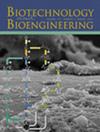RSEA: A Web Server for Pathway Enrichment Analysis of Metabolic Reaction Sets
IF 3.5
2区 生物学
Q2 BIOTECHNOLOGY & APPLIED MICROBIOLOGY
引用次数: 0
Abstract
Changes in biological pathways provide essential clues about metabolism. Genome-scale metabolic models (GEM) are network-based templates that computationally describe all stoichiometric associations and gene-protein reaction (GPR) relations found in an organism for all its metabolic genes and metabolites. Using reaction stoichiometry as input, GEMs mathematically simulate metabolic reaction fluxes occurring in an organism and predict changes in the metabolic system under the relevant condition. Multiple tools and approaches in the literature can capture fluxes sensitive to a given condition by using GEMs. However, functional enrichment analysis of these reaction lists in a systems biology perspective is not straightforward. Here, we introduce RSEA to annotate given reaction sets to significantly related metabolic pathways: Reaction Set Enrichment Analysis web server tool. RSEA converts given reaction list derived from GEMs into proper reaction identifiers and statistically analyze its enrichment in metabolic pathways. RSEA is designed to provide researchers with a practical and user-friendly platform to explore and interpret sets of reactions in biological pathways and freely available online (https://rseatool.com/).

RSEA:用于代谢反应集途径富集分析的Web服务器
生物学途径的变化为新陈代谢提供了重要线索。基因组尺度代谢模型(GEM)是基于网络的模板,它可以计算地描述生物体中所有代谢基因和代谢物的所有化学计量关联和基因-蛋白质反应(GPR)关系。GEMs以反应化学计量学为输入,以数学方式模拟生物体内发生的代谢反应通量,并预测相关条件下代谢系统的变化。文献中的多种工具和方法可以通过使用GEMs捕获对给定条件敏感的通量。然而,从系统生物学的角度对这些反应表进行功能富集分析并不简单。在这里,我们引入RSEA来注释给定的反应集到显著相关的代谢途径:反应集富集分析web服务器工具。RSEA将给定的反应表转化为适当的反应标识符,并统计分析其在代谢途径中的富集程度。RSEA旨在为研究人员提供一个实用且用户友好的平台,以探索和解释生物途径中的一系列反应,并可免费在线获取(https://rseatool.com/)。
本文章由计算机程序翻译,如有差异,请以英文原文为准。
求助全文
约1分钟内获得全文
求助全文
来源期刊

Biotechnology and Bioengineering
工程技术-生物工程与应用微生物
CiteScore
7.90
自引率
5.30%
发文量
280
审稿时长
2.1 months
期刊介绍:
Biotechnology & Bioengineering publishes Perspectives, Articles, Reviews, Mini-Reviews, and Communications to the Editor that embrace all aspects of biotechnology. These include:
-Enzyme systems and their applications, including enzyme reactors, purification, and applied aspects of protein engineering
-Animal-cell biotechnology, including media development
-Applied aspects of cellular physiology, metabolism, and energetics
-Biocatalysis and applied enzymology, including enzyme reactors, protein engineering, and nanobiotechnology
-Biothermodynamics
-Biofuels, including biomass and renewable resource engineering
-Biomaterials, including delivery systems and materials for tissue engineering
-Bioprocess engineering, including kinetics and modeling of biological systems, transport phenomena in bioreactors, bioreactor design, monitoring, and control
-Biosensors and instrumentation
-Computational and systems biology, including bioinformatics and genomic/proteomic studies
-Environmental biotechnology, including biofilms, algal systems, and bioremediation
-Metabolic and cellular engineering
-Plant-cell biotechnology
-Spectroscopic and other analytical techniques for biotechnological applications
-Synthetic biology
-Tissue engineering, stem-cell bioengineering, regenerative medicine, gene therapy and delivery systems
The editors will consider papers for publication based on novelty, their immediate or future impact on biotechnological processes, and their contribution to the advancement of biochemical engineering science. Submission of papers dealing with routine aspects of bioprocessing, description of established equipment, and routine applications of established methodologies (e.g., control strategies, modeling, experimental methods) is discouraged. Theoretical papers will be judged based on the novelty of the approach and their potential impact, or on their novel capability to predict and elucidate experimental observations.
 求助内容:
求助内容: 应助结果提醒方式:
应助结果提醒方式:


